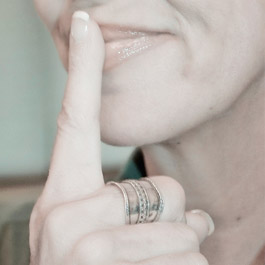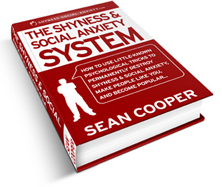The "Secret Cause" of Your Shyness or Social Anxiety

Have you ever wondered if people are born shy?
Or if it's a developed personality trait?
The truth is:
IT'S NEITHER
What do I mean by this?
In this post I'll answer that. Here's the question I got from a newsletter subscriber:
*** QUESTION ***
When I was a kid I wasn't shy at all. As I got older I just didn't talk as much, and whenever someone came up to talk to me, my heart would race for no reason.
If they said something to me, and I was supposed to say something back, my head would go blank, and I feel like I can't be myself around people. So I just came to the conclusion that I was shy.
I don't like being shy, because of it, it's hard to make friends. I want to know how to stop being this way.
Morgan
>>>>>> MY REPLY:
Hey Morgan,
You're in the right place!
Your situation is a very common one for many shy people. Shyness sometimes develops over time as a person matures into adolescence and adulthood.
Sometimes, a person "grows into" shyness instead of out of it.
Why does this happen?
It starts with the idea of SOCIAL FEEDBACK.
Social feedback is how we learn learn what is "good" or acceptable behavior at a young age.
Think about toddlers for a second.
Most of them don't understand language. If their mom says "Don't do that", they don't actually understand the words that she is saying.
But what they do understand is if they are getting a positive or negative reaction from their parents to what they are doing.
This is social feedback.
So, if at a young age you tried to step up and be confident and your parents told you "Be quiet" or something similar, then you would learn that that isn't acceptable behavior.
You wouldn't do that again. You would learn that acting in a shy or introverted way was the best way to get acceptance from the people around you. And social acceptance is one of the very basic human needs.
Trying to Be Confident is Actually Painful...
In fact, a recent UCLA study found that this negative social feedback activates the same area of the brain as when we feel pain.
So, just like when you put your hand on the stove as a child and your brain said "DO NOT DO THAT AGAIN", we start to avoid social situations that might result in the pain of rejection. Trying to be confident and the centre of attention is now seen by a certain part of your mind as being a behaviour that will result in you getting rejected.

Cool, huh?
So here's Social Feedback in a nutshell: We are constantly looking at how other people react to what we do in order to figure out what is "good" behavior. Simple.
And this happens ALL THE TIME.
In every interaction that you have ever had, you have looked at other people's reactions to what you are doing to see if it was "good".
And you don't even know you were doing it 99% of the time.
Everybody does this. The difference with shy people is that shy people are born with a genetic trait that makes them see other people's responses much more than a regular person.
Regular people can see some of this social feedback, but they can't see it as well as someone who eventually develops shyness. So for them a lot of negative reactions they get don't register in their brain.
This lets them seem to care a lot less about what other people around them think of them than shy people.
Okay, get it?
So, because you saw negative reactions when you tried to be confident as a child, you slowly developed negative feelings to social situations.
This is what made you become shy or socially anxious.
Now how to correct it? Here's the basic strategy:
The part of your brain that connects a certain stimulus to pain is called the Amygdala.
It is a primitive part of your brain that's designed to keep you safe from perceived threats. It makes you react immediately when it detects something which may mean danger.
By primitive, I mean that it isn't a part of your conscious, reasoning brain. It operates on a more basic level, underneath your conscious control. All it does is automatically associate pain to certain experiences and pleasure to others based on what it has witnessed in the past.
This means that you can't change use logical, rational arguments to change what your Amygdala knows to be true through experience.
Let me give you an example...
Have you ever tried to be confident before a group presentation and tried telling yourself "What's the worst that can happen?" How well did that work out?
Or any other logical reasons you tried to tell yourself not to feel anxious?
Logical thought doesn't overcome shyness. You cannot simply talk your amygdala out of reacting to certain stimuli that it has learned to identify as painful.
The only way to change the amygdala's reactions is through exposure to the feared stimulus combined with an experience that teaches the amygdala that nothing bad happens.
You have to slowly desensitize yourself and your amygdala will start to realize that there's nothing to fear. This can only be accomplished with A LOT OF repetition combined with changing how you think and behave on a core level.
That's all for now. I know this doesn't say "how" to overcome your shyness or social anxiety, but hopefully you now have a better understanding of where it came from.
Yours in Social Success,
Sean Cooper

Sign Up For Your FREE Member Newsletter
Liked This Article? Enter your email below to get my latest strategies and tactics on overcoming shyness and social anxiety sent straight to your inbox.
When you sign up, you'll also get instant access to a free report I wrote called "The 3 Biggest Mistakes Shy and Socially Anxious People Make."





